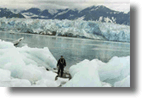
Large
calving action out on the point. The distance
between the point of land to the left (behind the tabs)
and the face of the glacier is 1/2 mile. It's BIG.!
Kayaking
at the Hubbard Glacier
(We are still traveling with the same group as from
Pack Creek.)
We flew an Alaska Airline's 737 to Yakatat (about 200 miles north
of Juneau).
We loaded all of our gear into canvas covered wooden framed kayaks and headed across the fjord closer to the glacier and the spot where we will make camp about ¾ of a mile from the face of the glacier. The paddle was almost surrealistic. We were in a heavy fog and had to stay fairly close to one another so we wouldn't get lost. We were repeatedly warned not to bump into each other or the icebergs with the kayaks since the canvas can tear. The changing tide caused periodic large icebergs and other quick flowing ice to come floating out of the fog. We had to make evasive maneuvers to miss the ice while keeping the other kayaks in sight. |
kayaks one at a time, quickly
unload, and "RUN" the gear and kayaks to higher ground. We were now so
close to the glacier that the calving ice would cause tidal waves on the
shore after each large ice chunk hit the water. The shoreline would go
from a totally calm beach to waves 5 or 6 feet high within seconds. This
would have been a very dangerous ordeal had we not had such knowledgeable
guides. And! We still haven't seen the glacier. It was kinda spooky and
we all loved it. This was an adventure! 
This ia a 5 phototograph composite. This is what we
could see from our campsite (about 1/3 of the face of the glacier).
It looks really close and the tidal wave action is awesome. While sitting on this rocky point our guide whipped out a tiny little cook stove and popped 2 pans of Jiffy Pop popcorn! (Peggy Wilcox, she's the best!)

 On
our hike to and from camp we walked through hundreds of huge chunks of
ice that ranged from the size of a car up to that of a small building.
As we walked along the beach we had to pick and choose corridors of ice
to walk through in maze like fashion. It was like walking in a fairytale
land.
On
our hike to and from camp we walked through hundreds of huge chunks of
ice that ranged from the size of a car up to that of a small building.
As we walked along the beach we had to pick and choose corridors of ice
to walk through in maze like fashion. It was like walking in a fairytale
land.
 The
second night as we had just retired for the night an enormous chunk broke
off and literally shook the ground we were laying on. At first, Patti
truly thought it was an earthquake. WOW.
The
second night as we had just retired for the night an enormous chunk broke
off and literally shook the ground we were laying on. At first, Patti
truly thought it was an earthquake. WOW.
The sights and sounds of the next two days were almost sensory overload. The last day was dry and mostly cloudy with a few sun breaks. We got glimpses of the towering mounts that surrounded us as we paddled to less than a half a mile from the face of the glacier on our way back to where the plane was to pick us up. Lots of close-up views of the calving and riding out a few tidal waves, but nothing too severe nor dangerous.
Of the many places we have visited around the world this is one of the most exceptional. We were in the first plane out and as the wheels cleared the rocky runway the pilot banked the plane sharply towards glacier. We flew close to the glacier wall at times looking up to see the top. We then flew up and over the glacier with our wheels less than 20 feet off the ice. We had a great view into the deep crevasses that made up the surface of this massive river of ice. As we flew back out over the water we saw maybe 60 to 100 harbor seals laying on the ice flows. This was a spectacular trip!
All
photographs, maps, and descriptions are copyright
Compass Multimedia Productions
Send
me an e-mail.
Visit the Alaska Discovery
web site. - Oh, and tell them,
"John Wall sent me."
Other pages of our Alaska Adventure
Alaska | Bears | Glaciers
| Whales
Other portions of my web site
Home
| Travel | Genealogy
| Photography | Web
sites | Photo Retouch







